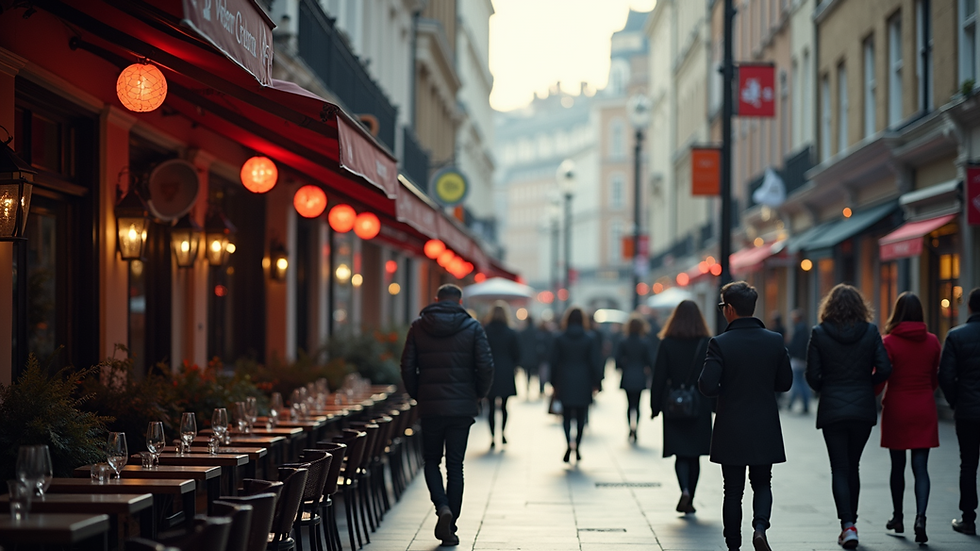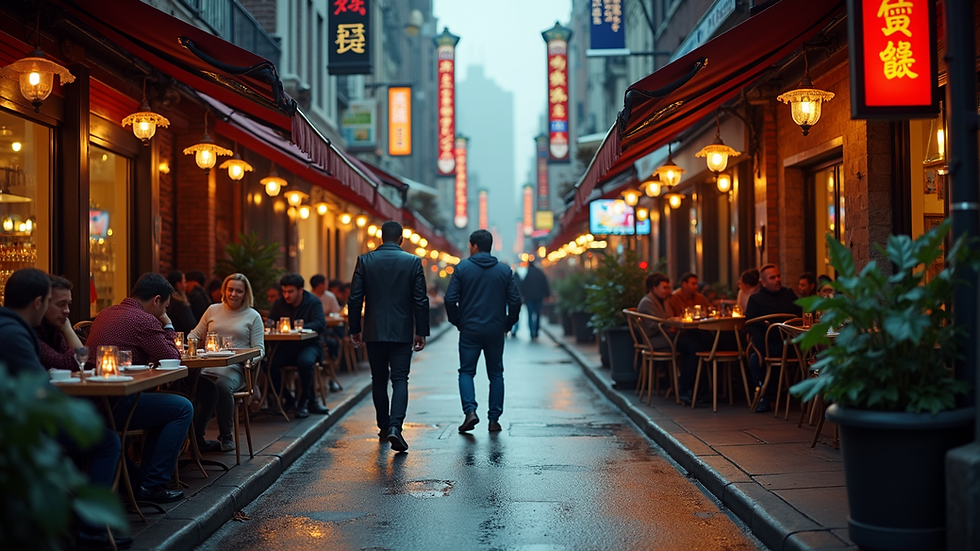Boost Your London Restaurant’s Visibility with SEO
- Ritwik Sastha
- Aug 11
- 4 min read
Running a restaurant in London is exciting but challenging. With so many dining options, how do you make sure your place stands out? The answer is simple: SEO. Search Engine Optimization is your secret weapon to attract more diners and grow your business. I’m here to share practical, easy-to-follow SEO tips for restaurants that will help you boost your online presence and get noticed by hungry Londoners.

Why SEO Matters for Your Restaurant
Imagine someone searching for "best Italian restaurant near me" on their phone. If your restaurant doesn’t show up on the first page of Google, you’re missing out on a huge opportunity. SEO helps your website rank higher in search results, making it easier for potential customers to find you.
SEO isn’t just about keywords. It’s about creating a great online experience that matches what your customers want. When done right, SEO can:
Increase your website traffic
Bring more footfall to your restaurant
Build your brand reputation
Boost your revenue
The best part? SEO works 24/7. While you’re busy serving delicious meals, your website is working hard to attract new diners.
Essential SEO Tips for Restaurants
Let’s dive into some actionable SEO tips for restaurants that you can start using today.
1. Optimize Your Google My Business Listing
Google My Business (GMB) is a free tool that lets you manage how your restaurant appears on Google Search and Maps. Make sure your listing is complete and accurate:
Add your restaurant’s name, address, and phone number (NAP)
Upload high-quality photos of your food, interior, and exterior
Include your opening hours and menu
Encourage happy customers to leave positive reviews
A well-optimised GMB listing improves your chances of appearing in the local pack - the top three local results Google shows for searches.
2. Use Local Keywords
Think about what your customers might type when searching for a restaurant like yours. Use keywords that include your location and cuisine type. For example:
“Best seafood restaurant in Shoreditch”
“Family-friendly Italian restaurant in Camden”
Incorporate these keywords naturally into your website’s titles, headings, meta descriptions, and content. Avoid keyword stuffing - Google prefers content that reads well and provides value.
3. Create a Mobile-Friendly Website
Most people search for restaurants on their phones. If your website isn’t mobile-friendly, visitors will leave quickly. Use responsive design so your site looks great on any device. Make sure:
Pages load quickly
Menus are easy to read
Contact buttons are clickable
Google also favours mobile-friendly sites in its rankings, so this is a win-win.
4. Publish Engaging Content
Content is king in SEO. Share blog posts, recipes, event announcements, or behind-the-scenes stories. This keeps your website fresh and gives visitors a reason to come back. Plus, it helps you rank for more keywords.
For example, write about:
Seasonal dishes you’re featuring
How you source local ingredients
Tips for hosting private events at your restaurant
5. Build Quality Backlinks
Backlinks are links from other websites to yours. They signal to Google that your site is trustworthy and authoritative. Reach out to local food bloggers, tourism websites, or event organisers to get featured or collaborate.
You can also list your restaurant on local directories and review sites to increase your backlink profile.
Which Area in London Has the Most Restaurants?
London is a vast city with diverse dining scenes. Some areas are famous for their concentration of restaurants, making them hotspots for food lovers.
Soho
Soho is a vibrant area packed with restaurants, bars, and cafes. It’s known for its eclectic mix of cuisines, from traditional British to international flavours. If your restaurant is in Soho, you’re in a competitive but rewarding market.
Shoreditch
Shoreditch is trendy and popular with younger crowds. It’s a great place for innovative, modern dining experiences. SEO strategies here should highlight your unique offerings and trendy vibe.
Covent Garden
Covent Garden attracts tourists and locals alike. Restaurants here benefit from high foot traffic. Optimising for tourist-related keywords can help you capture this audience.
Camden
Camden is famous for its markets and street food. If you’re in Camden, focus on keywords related to casual dining and quick bites.
Knowing which area your restaurant is in helps tailor your SEO strategy to the local audience and competition.

How to Use Social Media to Support Your SEO
Social media and SEO go hand in hand. While social signals don’t directly impact search rankings, they increase your online visibility and drive traffic to your website.
Here’s how to make the most of social media:
Share your blog posts and menu updates on platforms like Instagram, Facebook, and Twitter
Use location tags and relevant hashtags to reach local audiences
Engage with followers by responding to comments and messages
Collaborate with local influencers to showcase your restaurant
Social media also helps build your brand personality, making your restaurant more memorable.
Tracking Your SEO Success
You can’t improve what you don’t measure. Use tools like Google Analytics and Google Search Console to track your SEO performance. Look at:
Website traffic sources
Keyword rankings
User behaviour on your site
Conversion rates (e.g., online bookings or contact form submissions)
Regularly reviewing these metrics helps you understand what’s working and where to focus your efforts.
Ready to Take Your Restaurant to the Next Level?
SEO is a powerful tool that can transform your restaurant’s online presence. By optimising your website, leveraging local keywords, and engaging with your community, you’ll attract more diners and increase your revenue.
If you want expert help, consider partnering with professionals who specialise in seo for london restaurants. They can tailor strategies to your unique needs and help you stand out in London’s competitive food scene.

Remember, SEO is a journey, not a one-time fix. Keep learning, experimenting, and adapting. Your restaurant’s success is just a few clicks away!

Comments